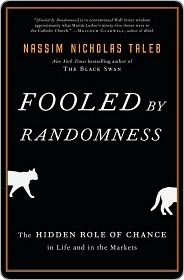Where statistics becomes complicated, and fails us, is when we have distributions that are not symmetric, like the urn above. If there is a very small probability of finding a red ball in an urn dominated by black ones, then our knowledge about the absence of red balls will increase very slowly—more slowly than at the expected square root of n rate. On the other hand, our knowledge of the presence of red balls will dramatically improve once one of them is found. This asymmetry in knowledge is not trivial; it is central in this book—it is a central philosophical problem for such people as Hume
...more
Welcome back. Just a moment while we sign you in to your Goodreads account.


